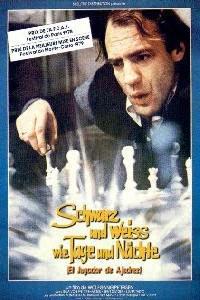This article needs additional citations for
verification. (June 2019) |
| Schwarz und weiß wie Tage und Nächte | |
|---|---|
 | |
| Directed by | Wolfgang Petersen |
| Written by | |
| Produced by | Georg Althammer |
| Starring | |
| Cinematography | Jörg-Michael Baldenius |
| Edited by | Johannes Nikel |
| Music by | Klaus Doldinger |
Production companies |
|
| Distributed by |
|
Release date |
|
Running time | 103 minutes |
| Country | Germany |
| Language | German |
Schwarz und weiß wie Tage und Nächte (Black and White Like Day and Night) is a West German film from 1978 directed by Wolfgang Petersen and starring Bruno Ganz.
Plot
Thomas Rosemund, a scientist who swore off playing chess after a nervous breakdown as a young wunderkind, creates an undefeated chess program. However, the Russian world champ beats the program in a televised match. The West German mathematician becomes a top chess pro himself, which the West German media boast will prove the superiority of Germany and democracy. Rosemund believes that the entire Red Communist bloc is out to stop him from vanquishing their own Stefan Koruga, to become the next Bobby Fischer and a symbol that capitalism is preferable to socialism.
Critical reception
John Simon called Black and White Like Day and Night "the best film ever about chess". [1]
References
- ^ Simon, John (2005). John Simon on Film: Criticism 1982-2001. Applause Books. p. 383.
External links
- 1978 films
- 1978 television films
- West German films
- German drama television films
- 1970s German-language films
- German-language television shows
- Films about chess
- 1970s psychological drama films
- Films directed by Wolfgang Petersen
- Films scored by Klaus Doldinger
- 1978 drama films
- 1970s German films
- Das Erste original programming
- 1970s German film stubs
- Drama television film stubs
This article needs additional citations for
verification. (June 2019) |
| Schwarz und weiß wie Tage und Nächte | |
|---|---|
 | |
| Directed by | Wolfgang Petersen |
| Written by | |
| Produced by | Georg Althammer |
| Starring | |
| Cinematography | Jörg-Michael Baldenius |
| Edited by | Johannes Nikel |
| Music by | Klaus Doldinger |
Production companies |
|
| Distributed by |
|
Release date |
|
Running time | 103 minutes |
| Country | Germany |
| Language | German |
Schwarz und weiß wie Tage und Nächte (Black and White Like Day and Night) is a West German film from 1978 directed by Wolfgang Petersen and starring Bruno Ganz.
Plot
Thomas Rosemund, a scientist who swore off playing chess after a nervous breakdown as a young wunderkind, creates an undefeated chess program. However, the Russian world champ beats the program in a televised match. The West German mathematician becomes a top chess pro himself, which the West German media boast will prove the superiority of Germany and democracy. Rosemund believes that the entire Red Communist bloc is out to stop him from vanquishing their own Stefan Koruga, to become the next Bobby Fischer and a symbol that capitalism is preferable to socialism.
Critical reception
John Simon called Black and White Like Day and Night "the best film ever about chess". [1]
References
- ^ Simon, John (2005). John Simon on Film: Criticism 1982-2001. Applause Books. p. 383.
External links
- 1978 films
- 1978 television films
- West German films
- German drama television films
- 1970s German-language films
- German-language television shows
- Films about chess
- 1970s psychological drama films
- Films directed by Wolfgang Petersen
- Films scored by Klaus Doldinger
- 1978 drama films
- 1970s German films
- Das Erste original programming
- 1970s German film stubs
- Drama television film stubs